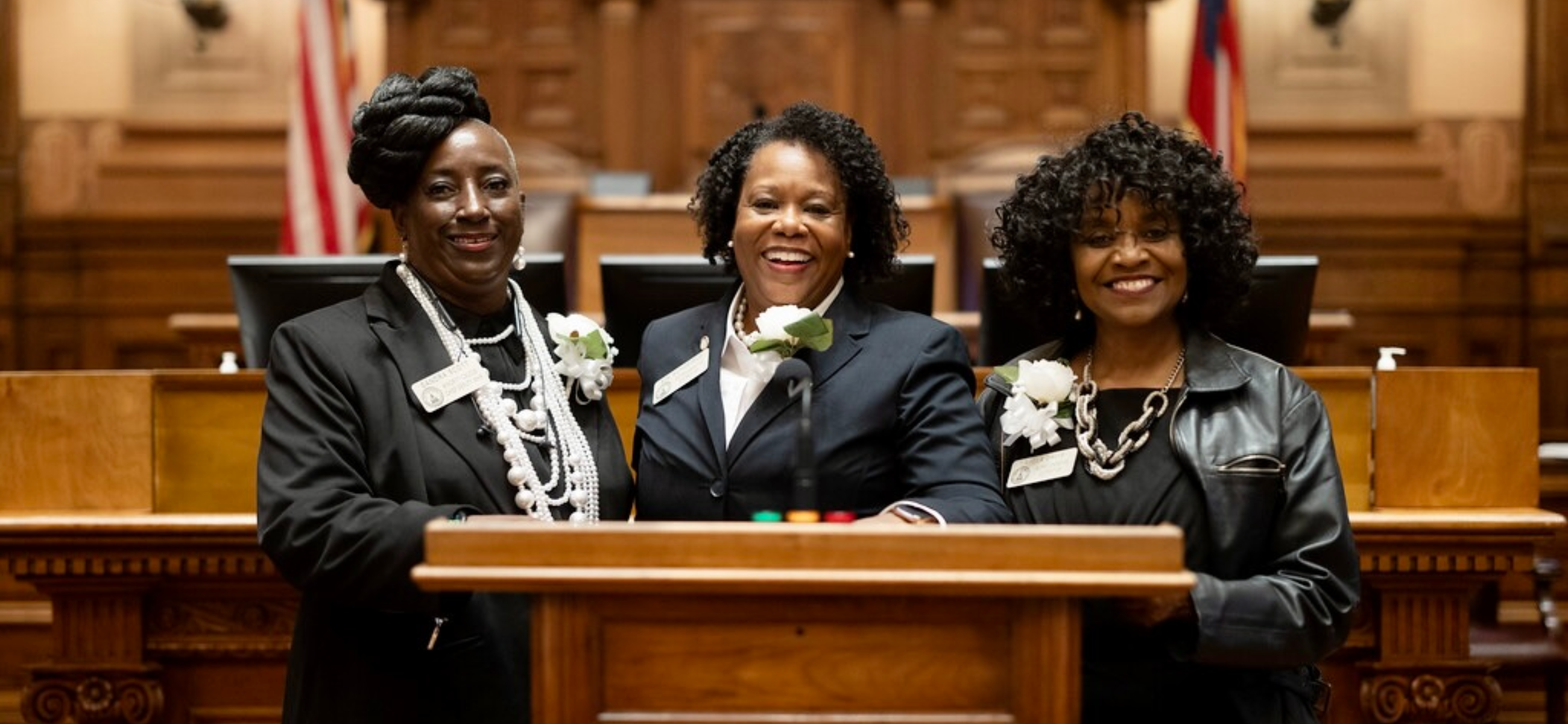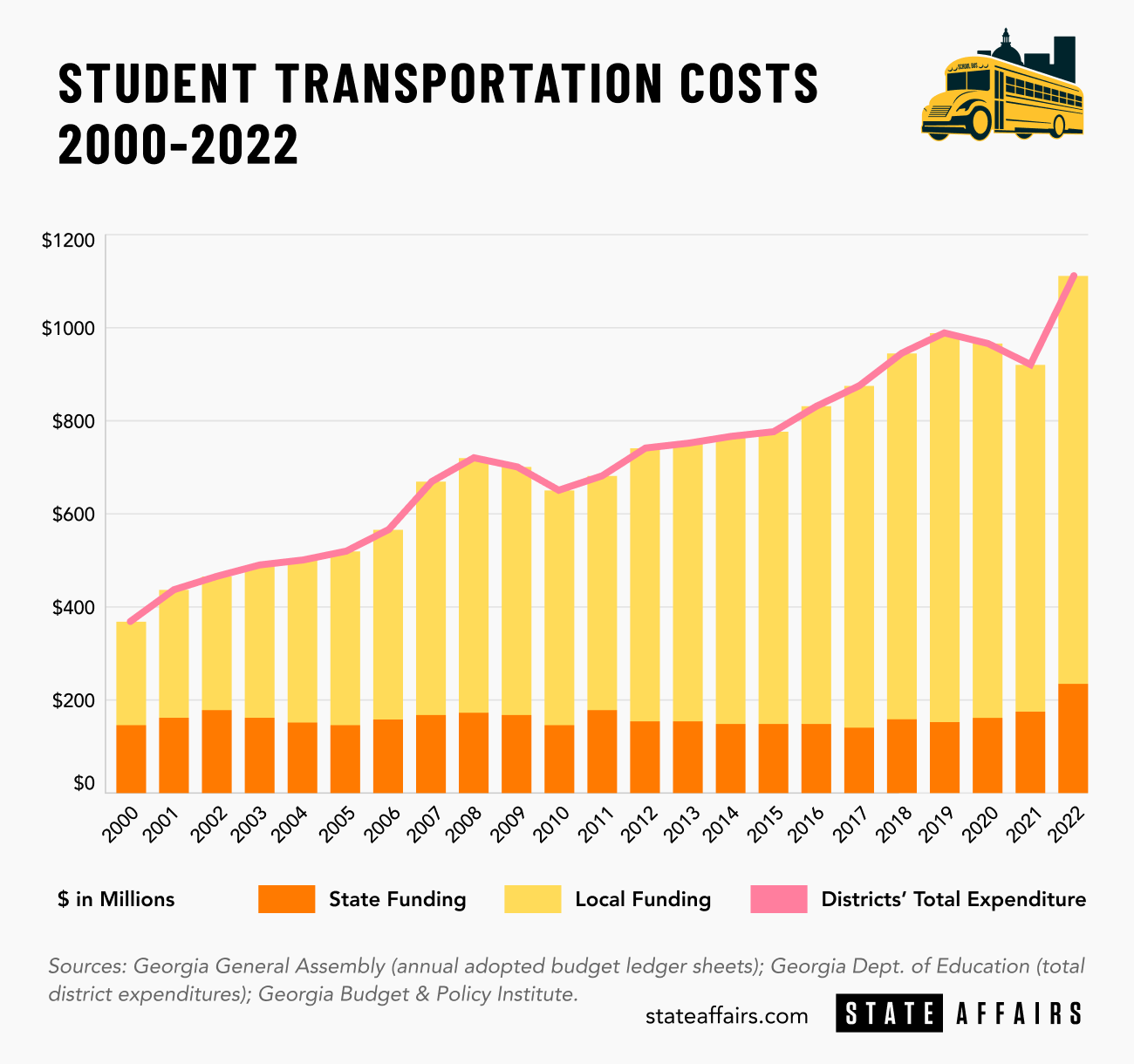Stay ahead of the curve as a political insider with deep policy analysis, daily briefings and policy-shaping tools.
Request a DemoSchool transport funding is high on agenda of 3 Democratic lawmakers

Reps. Sandra Scott (left), Kim Schofield and Viola Davis speak from the well regarding gun safety legislation. (Credit: Georgia House of Representative)
This story is part of an ongoing investigation that looks at the state’s aging school buses and bus driver shortages — a combination that is having a significant impact on the education of Georgia’s youth.

A bill to ensure adequate funding for school transportation is among the 2024 legislative priorities three Democratic lawmakers announced Thursday in a joint statement.
HB 712, which seeks to amend the Quality Basic Education funding formula to provide more funding for local school districts throughout Georgia, is part of the joint legislative agenda state Reps. Viola Davis, D-Stone Mountain; Sandra Scott, D-Rex; and Kim Schofield, D-Atlanta, said they will pursue during the 2024 legislative session.
HB 712, which also calls for full school transportation funding across all of the state’s districts, was introduced by Davis late in the 2023 legislative session.
What’s Happening
In a two-part series in May, State Affairs reported on Georgia’s school busing crisis, chronicling how aging bus fleets and driver shortages are negatively impacting students and schools across Georgia.
A three-month investigation revealed that in some districts, the school transportation system problems are so severe they’re causing crowded bus rides and tardiness for students, safety issues on some buses and a drop in student achievement at some schools.
“Georgia has a recurring issue of inadequately funding pupil transportation, which poses safety concerns and imposes significant financial burdens on local school districts,” the legislators wrote in their bill summary.
The state’s share of the cost of student transportation has dropped steadily over the past 20 years. In 2002, the state covered $178 million, or 40%, of the total $444 million cost of student transportation. In 2022, the state allocated $232 million to school districts, representing only 20% of the $1.1 billion total cost of student transportation.
Why It Matters
The state has been covering 15% to 20% of the total transportation cost over the past 10 years, thus shifting most of the financial responsibility to local school districts.
HB 712 calls for the state Board of Education to change how it calculates the annual cost of student transportation for each school district so that the state will cover more of the actual costs incurred by schools. That includes adding the cost of health insurance back into the state’s responsibilities, and raising the minimum salaries of bus drivers from $500 per month to $2,000 per month. It strikes language in current law that says regular transportation (to and from school) must be fully funded before travel off campus for vocational training and field trips can be funded.

The bill also proposes expanding the school bus routes covered by state funding. Currently, the state only pays to transport students who live at least one and a half miles away from their assigned school, or students with disabilities. The proposed bill would add students who live closer and can’t walk to school or get to school without a ride due to safety concerns including “lack of traversable sidewalks and bike lanes, congested intersections, and otherwise unsafe conditions.”
In an effort to address the high cost of school bus repair and replacement, which has led to increasingly aging bus fleets hampered by mechanical issues in many districts, the bill allows for vehicles other than school buses to be used to transport students. A Republican-sponsored bill, HB 51, that would have allowed cash-strapped schools to use vans or SUVs in lieu of school buses passed in the House but stalled in the Senate in the last session.
What’s Next
In addition to school transportation, the trio said they will continue their advocacy for protecting and expanding voting rights and are examining potential legislative proposals that aim to safeguard the democratic process and promote inclusivity in the electoral system.
Also, Davis, Scott, and Schofield plan to pursue the passage of legislation that addresses over-incarceration, sentencing disparities, and the disproportionate impact of the criminal justice system on marginalized communities. They intend to create a system that focuses on rehabilitation, reduces recidivism, and fosters community healing, they said in a press release.
Gun safety reform, the housing crisis in Georgia, and expanding access to affordable and quality health care, including expanding Medicaid, improving the state’s healthcare infrastructure and addressing healthcare disparities are also on their joint agenda.
Related:
Contact Jill Jordan Sieder on Twitter @JOURNALISTAJILL or at [email protected].
Twitter @STATEAFFAIRSGA
Instagram @STATEAFFAIRSGA
Facebook @STATEAFFAIRSUS
LinkedIn @STATEAFFAIRS
Header image: (From left) Reps. Sandra Scott, Kim Schofield and Viola Davis speak from the well regarding gun safety legislation. (Credit: Georgia House of Representatives)
Busing Breakdown logo: (Credit: Brittney Phan)
Professionals still face licensing delays amid state’s transition to online system
The Gist Georgia’s professionals and business owners are still struggling to obtain professional licenses in a timely manner. As the Secretary of State’s Office rolls out its new Georgia Online Application Licensing System to expedite the process, the efficiency of this new process is being put to the test. What’s Happening Thursday morning at the …
Controversy over AP African American Studies class grows
Rashad Brown has been teaching Advanced Placement African American Studies at Atlanta’s Maynard Jackson High School for three years. He’ll continue to do so — even though the state’s top education official removed it from the list of state-funded course offerings for the upcoming school year. While Brown prepares to start teaching his class on …
Students, teachers, lawmakers blast decision to end AP African American history classes
ATLANTA — A coalition of lawmakers, civil rights leaders, clergy, educators and students Wednesday called on the state’s education czar to rescind his decision to drop an advanced placement African American studies class from the state’s curriculum for the upcoming school year. “This decision is the latest attack in a long-running GOP assault on Georgia’s …
Kamala Harris’ presidential bid reinvigorates Georgia Democrats
Georgia Democrats have gained new momentum heading into the November election, propelled by President Joe Biden’s decision to bow out of his reelection bid and hand the reins to Vice President Kamala Harris. The historic decision, announced Sunday, is expected to prove pivotal in the national and state political arenas and breathe new life and …




